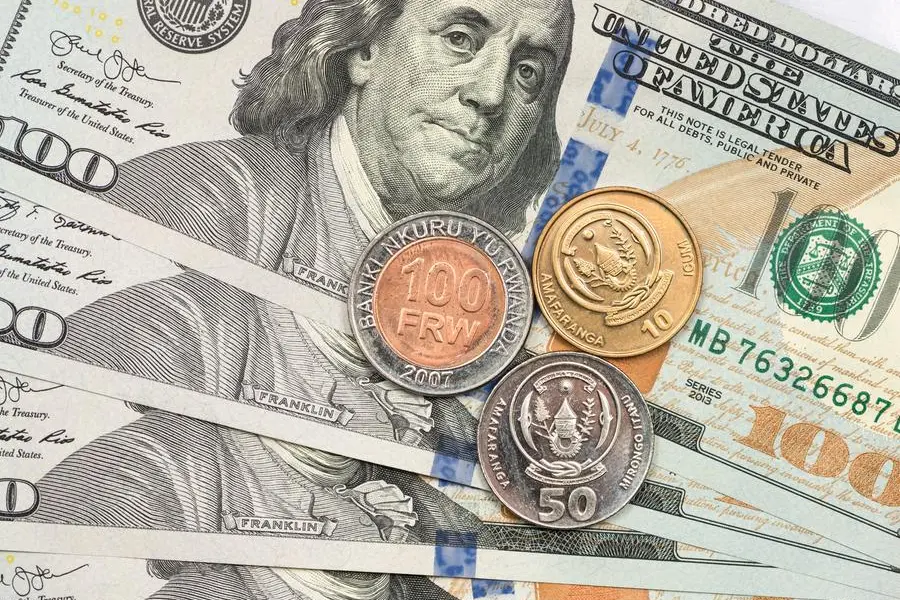PHOTO
The Rwandan Franc (RWF) has depreciated by 16.3 per cent against the US dollar during the 2023/2024 fiscal year due to economic contractions from geopolitical hangovers.
John Rwangombwa, the Governor of the National Bank of Rwanda, revealed this while addressing the Senate on pressing financial and economic challenges this week.
He attributed the shedding of the Franc to a sharp fall in the prices of Rwanda’s main exports, like minerals, coffee, which significantly reduced the country’s foreign exchange earnings.
The bulging import bill, as the country invests in capital goods to power its development, has further widened trade deficit, worsening the Franc’s value.“As you must have seen or heard from the markets, the Rwandan Franc has significantly depreciated against the US dollar, shedding by 16.3 per cent against the USD. The prices of Rwanda’s main exports — minerals, coffee, and tea — declined, reducing foreign exchange earnings. This widened the trade deficit and affected the exchange system,” said Rwangombwa.
In the forex market, $1 has reached Rwf1402 from Rwf1200 a few months ago. Responding to the governor’s address, one of the senators, Alex Mugisha, challenged the bank to employ all measures to stop the depreciation, and stabilise the economy.“The central bank should stand in its role as a regulator to stabilise both the Franc from further depreciation and also ensure prices on the market don’t surge. There’s no way around it.”Economic analysts attribute the sharp depreciation to low agricultural production and the country’s abysmal manufacturing output, making Rwanda a net importer.
Ukraine-Russia war“The quality produced or manufactured is one thing, but the quantities we produce as a country are still very low, when it comes to agricultural production. The country is still impeded by factors such as lack of adequate technologies, seeds and fertilizer,” said Seth Kwizera, the executive director of EPRN, an economic research body.
The franc depreciated by 18 per cent in 2023. The central bank projects depreciation to stand at 9 per cent at the close of 2024, as global shocks from the Ukraine-Russia war and other geopolitical conflicts, as well as the lingering effects of Covid-19 continue to hover on Rwanda’s economy.
The bank’s report also highlighted mixed performances of the Franc against regional currencies.
While it appreciated by 0.82 per cent against the Tanzanian shilling in June 2024, it weakened significantly against the Kenyan shilling (25.61 per cent) and the Ugandan shilling (5.70 per cent).
The country is also experiencing a dollar shortage, which analysts say it has partly been brought by black market dollar trading. Despite these challenges, Rwangombwa expressed optimism about the economy’s recovery.
Read: Rwanda hit by dollar shortage as franc weakens“This year, we project the depreciation to halve to around 9 percent,” he noted, adding that ongoing efforts are gradually stabilising the currency.
The governor emphasised the need for structural reforms to strengthen Rwanda’s economy and reduce its vulnerability to external shocks.
The Senate urged the Central Bank to prioritise consumer protection and implement measures to stabilise the currency and inflation.
The fact that Rwanda is paying back external loans has exposed the country to forex losses, spilling effects to currency and shortages.
The International Monetary Fund (IMF) recently expressed concern about Rwanda's rising public debt to GDP, which it says is expected to reach 80 percent of GDP by 2025, as fiscal consolidation slows down, despite the country’s positive economic growth trajectory.“Recurrent shocks in recent years complicated the authorities’ objective to rebuild policy buffers.'Fiscal consolidation has been slower than envisaged under the program, failing to halt the continued increase in the public debt-to-GDP ratio, which is expected to reach 80 percent of GDP in 2025,” read the IMF statement.
With the body encouraging increased access to concessional financing, “as it creates an opportunity to implement critical reforms” adding that this does not however serve as substitute for domestic revenue mobilisation, which it says has recently slumped.“To reduce vulnerabilities, contain inflation, and ensure debt sustainability, Rwanda needs strong fiscal consolidation, better domestic revenue mobilisation, continued data-driven monetary policy, and exchange rate adjustments,” IMF saidAs Rwanda works to navigate these economic difficulties, the discussions highlighted the importance of regulatory oversight, financial literacy, and boosting international trade to ensure long-term economic resilience.
International reserves stood at 4.5 months of prospective imports at mid-2024, providing a buffer against external shocks.
© Copyright 2022 Nation Media Group. All Rights Reserved. Provided by SyndiGate Media Inc. (Syndigate.info).




















